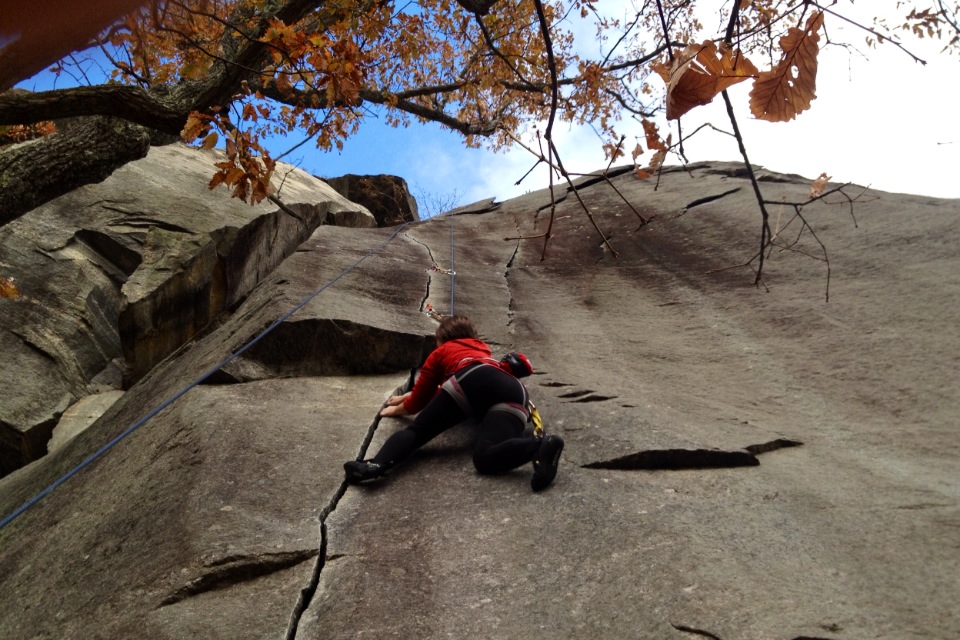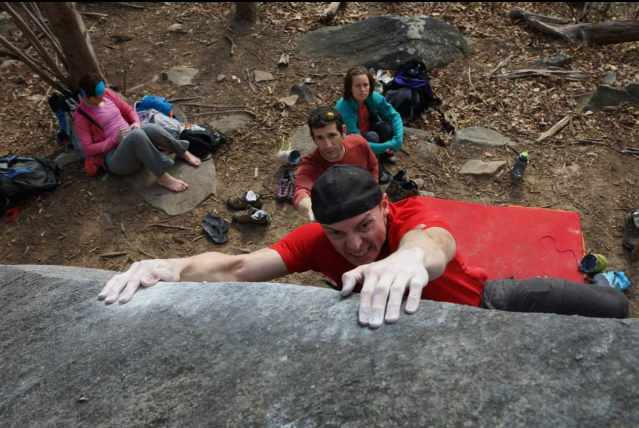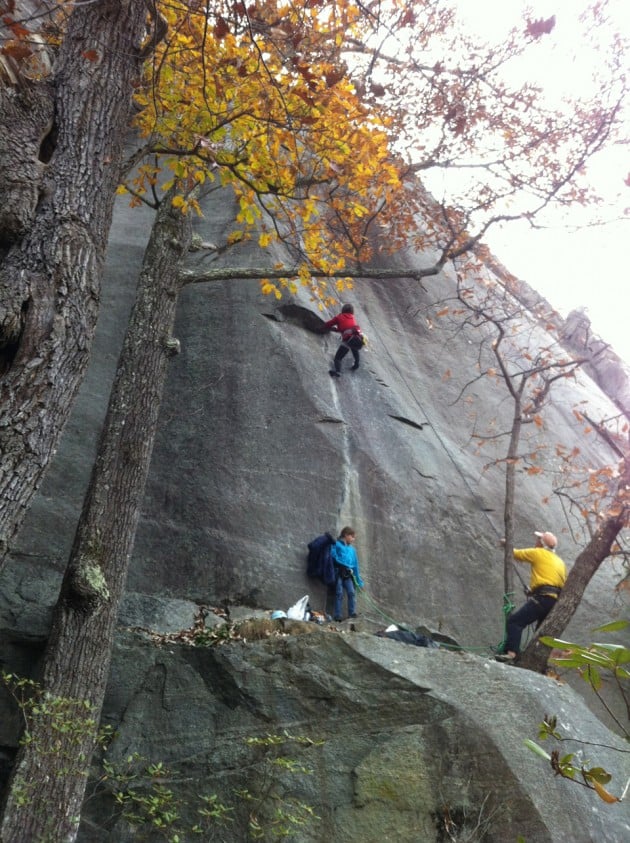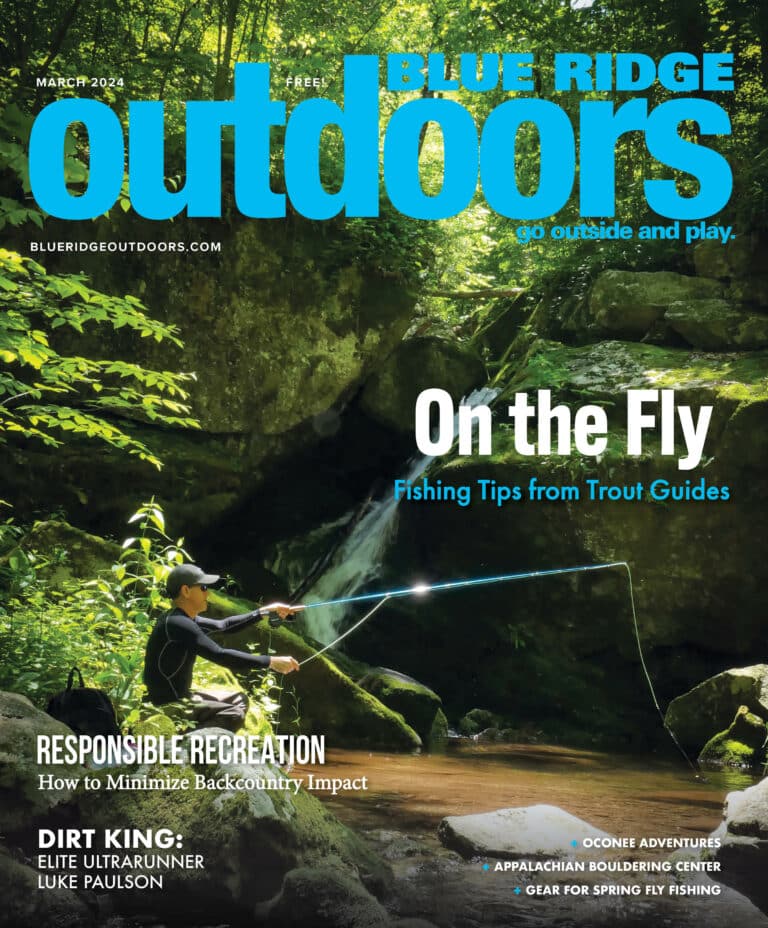For years, Rumbling Bald, located just minutes from Lake Lure’s Rumbling Bald Resort, has been a hideaway location for local and visiting rock climbers and bouldering enthusiasts. In even more recent years, the rocks have become a haven for brave climbers. We sat down with Joe DiSciullo, veteran climber, to discuss the opportunities at Rumbling Bald and some tips to help you get started.
Climbing at Rumbling Bald
With its mix of bouldering, traditional, and some sport opportunities, Rumbling Bald is, in Joe’s opinion, “hands down, the winter destination in North Carolina for climbers”. Why a winter destination, you ask? During the warmer months, poison ivy grows rampant throughout the area and would make for a very uncomfortable and subsequently itchy climbing experience. However, in cooler months (fall, winter and early spring), when the ivy has died and the south facing sun makes the rock surface about 10 degrees warmer than the air temperature, you’ll find no better climbing arena in the area.
Joe isn’t the only one who seems to be taken with the area. On a dry day, enthusiasts flock to Rumbling Bald to try their hand at bouldering. Joe suggests arriving, by carpool, by at least 9:45 in the morning if you want a parking spot. As the sport’s popularity has resulted in a tremendous amount of development in the area, you may be worried about overcrowding, but Joe assures us that in the rock climbing world, “if you want solitude, you’ll find it. You just need to walk a little farther”.
Climbing Tips and Gear Needed
If you’re a beginner, you’ll want to stick to the numerous bouldering opportunities at Rumbling Bald. Bouldering is a form of rock climbing used without ropes or a harness and takes place on boulders and other small rock formations. To boulder at Rumbling Bald, you’ll need a crash pad, climbing shoes and a chalk bag.
Traditional or trad climbers who wish to take advantage of scaling the many large rock faces at Rumbling Bald, will want to bring cams, nuts, climbing shoes, chalk bag, helmet and a belay device. This type of climbing involves placing gear into the rock while ascending, it is more dangerous and should only be attempted after training or with an experienced supervisor.
Rumbling Bald also offers some sport opportunities which involves the use of protection (bolts) or permanent anchors which are already attached to the rock walls. Gear needed includes: climbing shoes, harness, chalk, quickdraws, rope, helmet and a belay device.
If you’re not an experienced climber, take caution and stick to bouldering. If you’re interested in learning how to climb but don’t have a veteran to teach you, check out Fox Mountain Guides & Climbing School. Fox offers rock climbing at Chimney Rock in the Chimney Rock State Park throughout the year.
If you are an experienced climber, consider purchasing the newly published guide, “A Climber’s Guide to North Carolina’s Rumbling Bald” by Mike Reardon and Sean Cobourn. With 360 routes described on the south face of Rumbling Bald Mountain, Mike and Sean deliver detailed notes and tips on climbing Rumbling Bald.
Travel Tips
Are you a serious climber or a beginner who wants to ensure prime access to Rumbling Bald? Check out Rumbling Bald Resort on Lake Lure. Just a short drive from the climbing destination, the Resort offers a wide variety of lodging options including studios, condos and larger vacation homes to fit any budget. Climbers can also take advantage of one of the Resort’s three on-site restaurants, spa and salon, 2 championship golf courses, lake side “beach” access and of course spectacular views.
The Resort is also a prime location for day trips to other climbing opportunities in the area including, Looking Glass Falls in Brevard, Linville Gorge, Table Rock and Blowing Rock.
–Joe DiSciullo began his climbing adventures 15 years ago in the northeast from a prominent guide in that area. As his skills developed, he began learning and taking on harder climbs. Through the years, he has branched out to safer types of climbing in the southeast.











